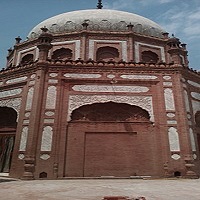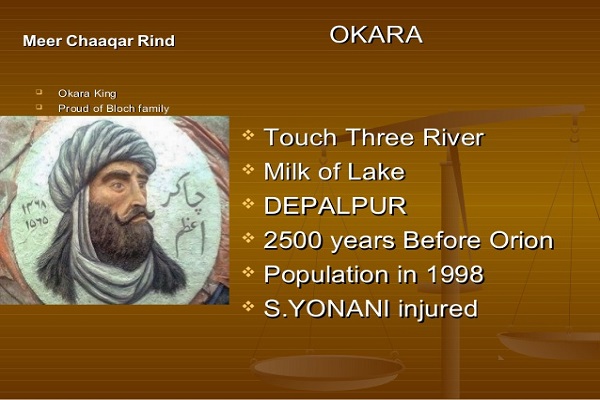Okara has situated 130 km in the south-east of Lahore, Punjab, Pakistan. The city consists of 10 union councils. It is the capital of the Okara district, and it is also known as Mini Lahore. The Sutlej River is located to the east, while the River Ravi is 100 km to the west. It is famously known as the Land of Warriors for the bravery of its people.
The region shares borders with Bahawalnagar in the south, Kasur in the East, Nankana Sahib, and Faisalabad in the North, Pakpattan in the South-West, and Sahiwal in the West. With its proximity to neighbouring India in the south-east, the area is strategically and geography significant.
It is the milk lake of Pakistan as it produces the highest amount of milk in the country. This town is the birthplace of many well-known artists and politicians. This article has every detail about the city, including Okara History.
| Title | Description |
|---|---|
| Information | |
| Location: | Pakistan |
| Name : | Okara |
| In Urdu : | اوکاڑہ |
| City Council: | Government of Punjab |
| Type: | Capital city of Okara District |
| Local Language Name: | Punjabi,Urdu |
| Province: | Punjab |
| Coordinates : | 30.80909°N 73.447723°E |
| District: | Okara District |
| Region: | Punjab |
| Elevation: | 105 m (344 ft) |
| Union councils: | 10 |
| Language | |
| Official Language: | Urdu |
| Native Language: | Punjabi |
| Other Languages: | Urdu.Punjabi.English |
| Government | |
| Type: | Government Of Punjab |
| Area | |
| Total Area: | 4,377 km2 (1,690 sq mi) |
| Population | |
| Total Population: | 1,887,915 |
| Time zone | |
| Time zone: | PST (UTC+5) |
| Codes | |
| Postal code: | 56300 |
| Dialing code: | 0442 |
| Vehicle registration: | Three letters beginning with O and random four numbers |
Table of Contents
Okara History
Okara is a historic place, and several historical records suggest that the region is 3000 BC old. Archaeological artifacts and remains of ancient civilizations attract visitors from all over the world. During the Indus Valley Civilization, the area was an agricultural region with forests. The title is credited to Okan, the name of the tree. According to some historical accounts, it was initially known as Okanwala.
This area was under the influence and control of several dynasties. The invasion and settlements of Aryans, Daradas, Kaikayas, Kambojas, Kurus, Madras, Malavas, Pauravas, Saindhavas, and Yaudheyas in this region are mentioned in historical accounts and legends.
Defeat of Alexander
Alexander the Great could not conquer this territory due to the bravery of native people. He was defeated here in 331 BCE and later died because of the wounds suffered in the battle. Later it became the battleground for people such as the Turks, Mughal Emperors, Arabs, Tugliqs, Persians, Mangola, Merhattas, Sikhs, Lodhis, and Hindus.
Historians describe that the Empires, such as Maurya, the Indo-Greek Monarchy, the Kushan, the Gupta, the White Huns, the Kushano-Hephthalites, the Turkish and Hindu Shahi Kingdoms, also ruled Okara.
Ruled By Delhi Sultanate
Delhi Sultanate ruled this region from 1206 to 1526. Until 1770 AD, the Rajpoots controlled this land, and after that, Mughals. Sikh took control of this territory from the declining Mughal Empire. Later in 1849, British invaders seized control of the region after defeating Sikh rulers.
The people of this region stood up against the British in the famous Independence War of 1857. The natives fought gallantly and gave defeat to the British army.
Geography
Topographically it is situated at 30.80°N and 73.44°E on the geographic coordinate system. This land’s total area is 4,377 km2, and its elevation is 186m (or 610 ft.) above sea level.
Okara Climate
The climate is typically mild and dry. The summers are hot, and temperatures may rise as high as 113°F (45°C) from May to July. The winter is cold when temperatures can drop to 37°F (3°C) from December to February. The average rainfall per year is 200 mm.
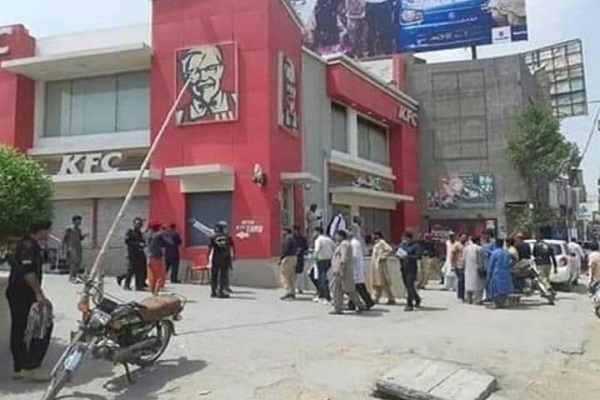
Population
The city is home to 3039139 individuals, according to the 2017 census. The population density of the area is 690/km2 (1,800/sq. mi), the makes it Pakistan’s 25th largest city.
Culture
The society is composed of several ethnic communities with their unique heritage and cultural legacies. Tribes and clans such as Lashari, Rajpoot, Sial, Jats, Shaikhs, Lodhis, Kharals, Kamyanas, Wattus, Kambohs, Noons, Bhutta, Jakkhar, and Khanzadas are well-known.
The natives cherish traditional festivities, hot and spicy cuisines and colourful attires. Dahi Barey of Okara is famous all over Pakistan.
Education
The literacy rate in Okara is gradually improving with the government’s efforts. The majority of the population resides in villages; therefore, special attention is being given to promote education in this region. The contribution of the district government is commendable.
Following is the list of some institutions providing primary, secondary, tertiary, and education for special people:
- University of Education
- University of Agriculture
- Superior College of Commerce
- Punjab College of Commerce
- Govt. College for Women
- Govt. College of Commerce
- F.G. Degree College
- Govt. Postgraduate College
- Stars Academy
- Step Institute
- Spirit Academy
- University of Okara
- Career Institute
- Kips Academy
- New Pak College of Commerce
- Concordia College
- Quaid-e-Azam College of Management & Commerce
- Quaid-e-Azam Law College
- Govt. Secondary School of Special Education
- Government Special Education Center
- Govt. Institute for Slow Learners
- Govt. Special Education Center
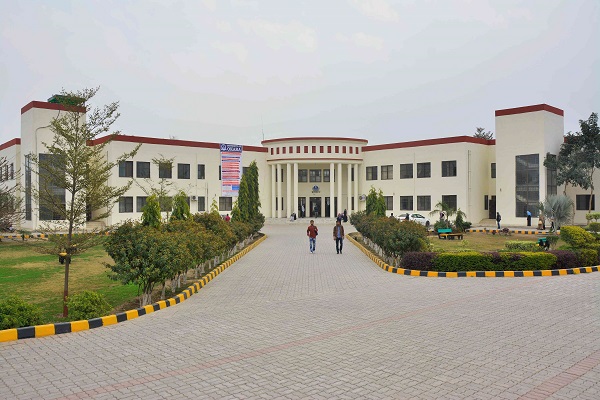
Sports
Activities in sports primarily include:
- Cricket
- Hokey
- Football
- Basketball
- Horse Riding
- Swimming
Economy
Okara’s share in economic growth is significant. A network of mills and factories and the vast production of agricultural products make it a substantial contributor to Pakistan’s economy.
Industry
Since Pakistan’s independence, the city has been a significant contributor to the national economy and human resources. There were two textile mills in the area at that time. One of the textile mills, Sutlej textile mill, was Asia’s largest textile mill.
There are still several mills and factories in the town, providing employment opportunities in the region. Industries such as the International Food industry, ghee, wellness, and rice mills are prominent.
Agriculture
The district is renowned for its fertile land, pleasant natural environment, and green fields of potatoes, tomatoes, sugarcane, Rice, wheat, and maize. The cultivation of Oranges and mangoes is abundant. For irrigation, a well-established network of the canal system is established.
It is also famous for its Guava, Lemon and grapefruit orchards that belong to Mitchell’s Fruit Farms Limited, a food processing company. The orchard spreads along the Lower Bari Doab Canal (LBDC) from Renala Khurd up to the Okara bypass for approximately 6 miles. Okara is very rich in livestock population and production.
It is famous for its breed of cattle known as Sahiwal and a breed of water buffalo known as Nili-Ravi. There is a Livestock Production Research Institute as well as Okara.
Tourism
Archaeological relics of various prehistoric dynasties such as the Indus Valley civilization, the Persians, the Ghaznavids, the Sultanates, the Mughal Empire, the Sikh Raj, and the British Rule mesmerizes the tourists.
Weather analysis and reviews suggest that October and November are the best months to visit Okara. The minimum and maximum temperatures vary from 13°C to 27°C. Following is the list of some of the prominent and worth visiting landmarks:
- Depalpur Fort
- Company Bagh (Captain Safder Shaheed Park)
- Yaadgar-e-Shuhda
- Old Mound Grave Yard
- Moza Akbar
- Thatta Ghulamka Dheroka
- Sulemanki Headworks
- Sadki Check Point
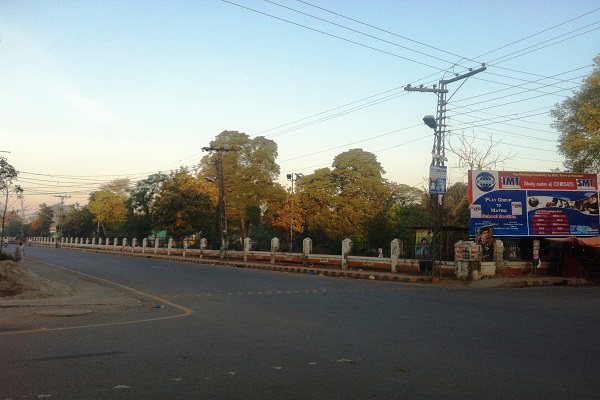
Languages
People can speak and understand:
- Punjabi
- Haryanvi
- Rangri
- Majhi
- Jhangvi
- Rachnavi
- Urdu
- English
Travel
The city can be reached from anywhere in Pakistan. Many bus services are operating to carry and bring in people from all over the country. National Highway N-5 links the city for visitors traveling by road. People using rail services can embark and disembark at the Okara Railway Station.
Airports near Okara include:
- Okara Cantonment Airstrip, 11.68 km
- Faisalabad International Airport (LYP), 75.37 km
- Bahawalnagar Airport (WGB), 97.89 km
Okara Postal Code and Area Code
Postal Code: 56300
Area Code: 442
